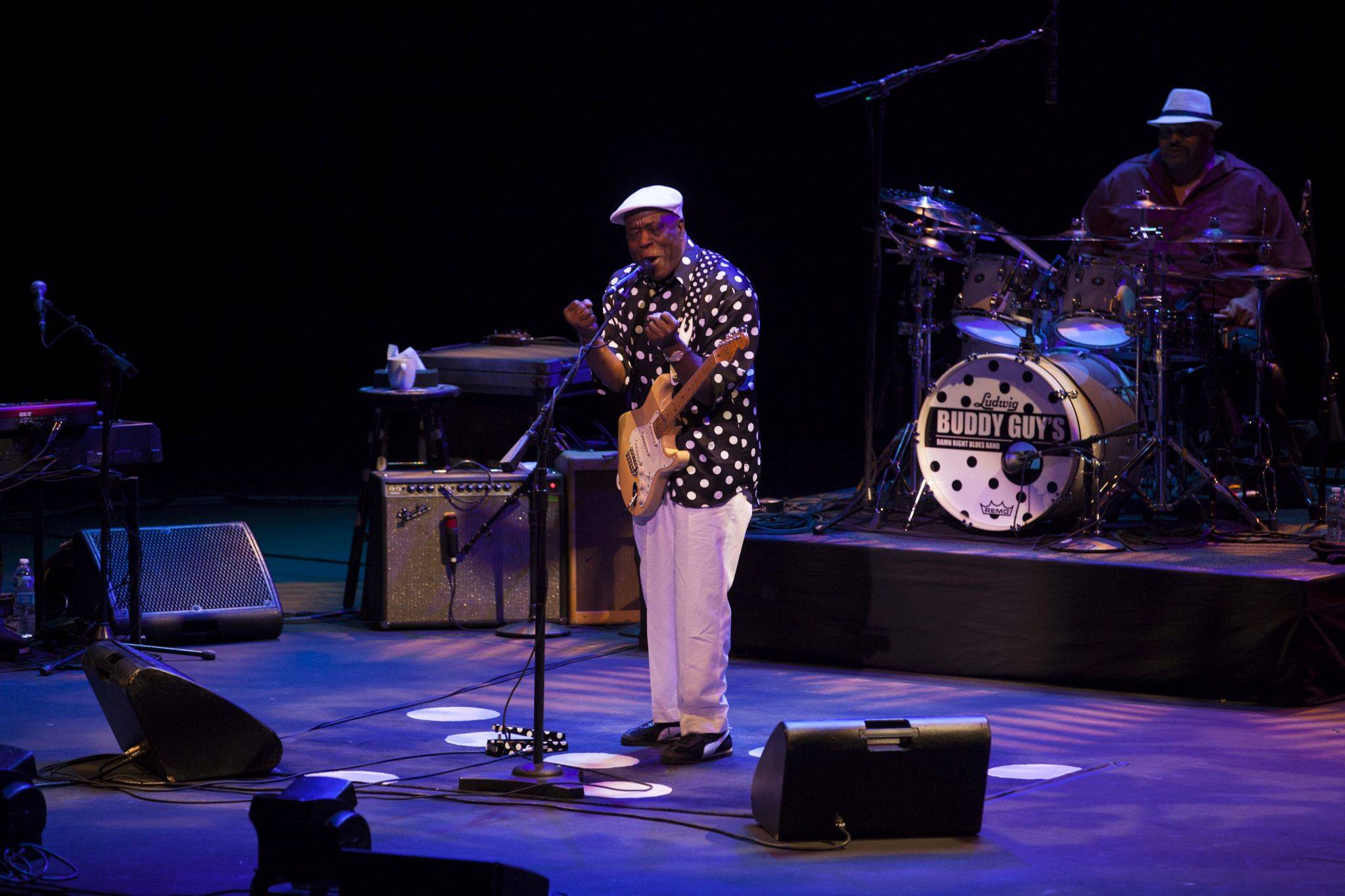The guitar, as a symbol, as well as the music it helps to create, can represent wildly different things depending on who’s listening or playing. To some, it’s noise; to others, freedom. To many, it is the way to find (or amplify) a voice that requires no words to be understood. It plays a key role in the traditions of countless cultures. It can facilitate campfire singalongs just as easily as it can foment non-violent rebellion. It’s one of, if not the most, popular instruments in the world.
It’s Hendrix melting faces, Dylan’s (possibly treasonous) (d)evolution from acoustic to electric performance, the intricacy of Segovia and a tool for innovation in the hands of St. Vincent. It’s also accessible and elusive. You can pick one up and start strumming the chords to a basic song within an hour; you can also spend a lifetime trying to master it.
You could also spend a lifetime learning the story and history of the guitar but that work might be best left to the ethnomusicologists and diehard axemen and women among us. However, for anyone in Urbana-Champaign looking to take a peek into that rich history (and catch a world-class performance put on by a genre-defining (or genre-defying) guitarist), the ELLNORA Guitar Festival is here once again to illustrate and articulate the many ways that the guitar can enlighten and bring joy.
Much like its previous iterations, ELLNORA 2019 brings an enticing array of performers to venues around CU. In addition to headlining performances by jazz virtuoso Pat Metheny and blues legend Buddy guy, as well as shows that highlight the central role that the guitar plays in genres as varied as bluegrass and gypsy jazz, there will be panel discussions on the guitar as a political tool and guitar-making traditions, and a live podcast. The festivities begin with the Opening Night Party on Thursday, September 5th and end with a performance by C-U’s own Brandon Washington on Saturday, September 7th.
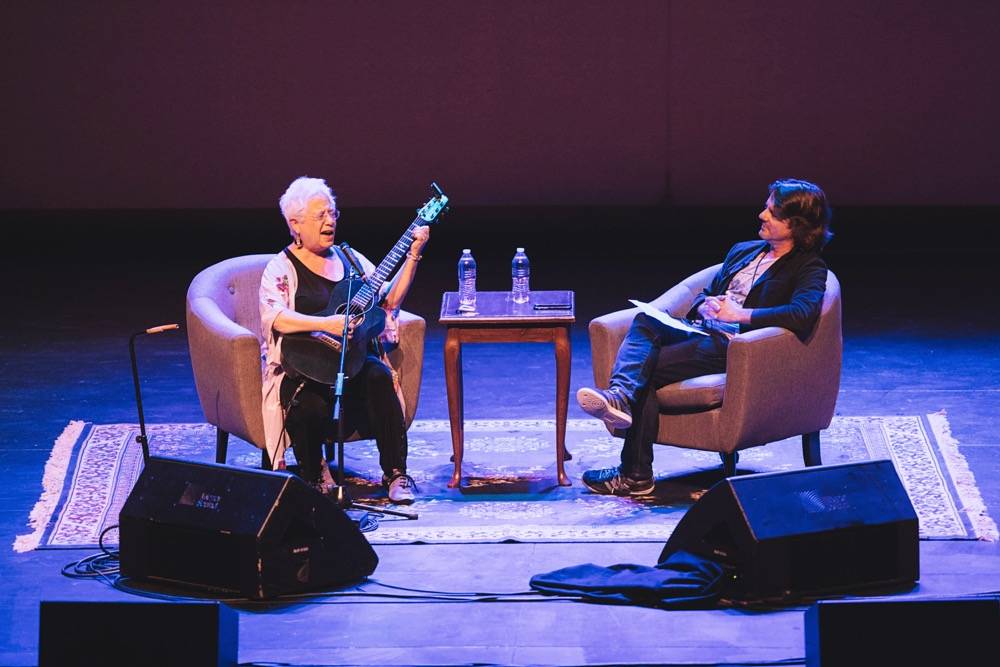
Janice Ian from ELLNORA 2017, photo by Anna Longworth
I recently had the chance to speak with David Spelman, the Artistic Director for ELLNORA. Mr. Spelman was kind enough to share a bit about the origins of the festival, his views on the unique joy that live music brings to a community, the crucial role that diversity and inclusion play in helping to push the boundaries of artistic expression, and what to expect from this year’s perfomances.
Smile Politely: Thanks for speaking with me, David. Right off the bat, can you tell us a little bit about yourself and your involvement with Ellnora?
David Spelman: Sure. The history of ELLNORA goes back to the beginnings of the New York Guitar Festival which is something that I, in a fit of insanity, decided to launch in 1999. I knew [Krannert Center Director] Mike Ross and worked with him as a consultant when he was at Columbia University. He was running a small, but very forward thinking performing arts program at the Miller Theater. He eventually left for the Krannert Center and I got the New York Guitar Festival off the ground not long after and he was an advisor, board member and all-around encourager for the guitar festival. From time-to-time, we’d talk about doing different projects centered around the guitar and I always appreciated his vision of what a performing arts center on a university campus can be: a public square, a classroom, a laboratory, and even a sanctuary.
I’ve always appreciated [Krannert Center Director Mike Ross’] vision of what a performing arts center on a university campus can be: a public square, a classroom, a laboratory, and even a sanctuary.
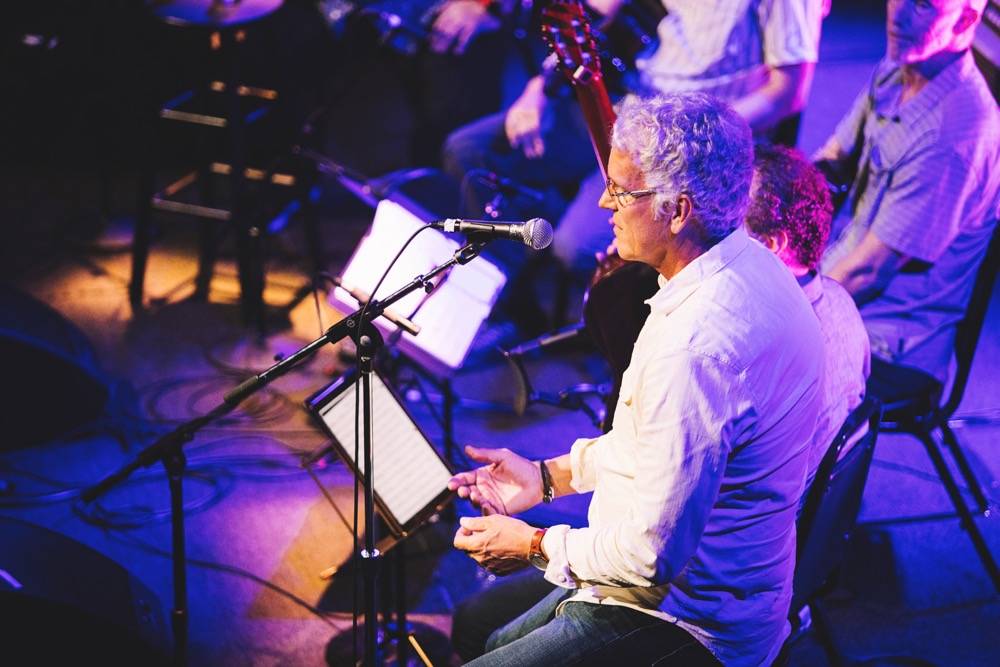
Krannert Center Director Mike Ross at ELLNORA 2017, photo by Anna Longworth
SP: What were some of the ideas that you guys want to convey through the festival?
Spelman: There are a couple of ideas. One is to tell the story of the guitar, where it’s from, what countries it’s traveled to, and, to some degree, where it’s going. And then the other question we’re exploring is “how many ways can a festival touch a community?” Will it just be artists playing concerts or is there room to explore commissioning new work and unique collaborations and film screenings and panel discussions and workshops? The maiden voyage for the festival was in 2005 and that vision for the festival is something we’ve never strayed from.
SP: So from the very beginning, the vision for the festival has centered around the guitar. Why a guitar festival?
Spelman: Well, it really stems back to my history as a guitarist. I was a classically trained guitarist but it was not too long into my education where it became clear to me that my impact, if any [laughs], in the music world was going to not be from on stage. Though I didn’t pursue a career as a performer, I wasn’t ever able to get particularly far away from music, or the guitar in particular.
In my job, I’ve been able to travel and do these kinds of festivals in Europe and Australia and Canada and the interesting thing is just how far and wide the guitar has traveled as an instrument. Everywhere you go in the world, you will find a guitar tradition. Every corner of Africa and Southeast Asia, India, all throughout South America, there are genuine guitar traditions. So what started as something more personal has become an exciting way to dive into different genres and explore the music of different cultures.
SP: It’s almost like you’ve got this massive thing that is music, and you have to approach it through some kind of lens, you have to narrow it down to something more focused and…
Spelman: …I just kind of stumbled into this, dude! [laughs] It was definitely more of a hazy notion at first. And it wasn’t something I thought I’d be doing for five years, let alone 20! I mean, it got some recognition early on but I kept thinking, “this is so limiting”. I guess I was looking for ways to keep it interesting for me within certain parameters. Would it have been as successful if the instrument in question was the trombone? Or bassoon?
SP: [laughs] Maybe not.
Spelman: I don’t know. But the guitar is… well, here we are!
SP: Absolutely! Continuing on the theme of limitations, what are some of the ways you keep this going and keep it new and fresh each time you put on a new festival like this?
Spelman: Well, I don’t think it’s necessarily “me” or an “us”, the creative team, Mike, Tammy [Kikta, Associate Director for Artistic Services at KCPA], and myself. I think it’s the incredible, vibrant diversity of the instrument and those people that gravitate towards it. I mean just look at the line-up for this year’s festival. We have, stylistically… it’s bananas.
SP: It’s incredible variety.
Spelman: We have musicians and genres from Madagascar and Niger to Brazil, Venezuela, and Colombia, and France, Germany, and Scotland. It’s really the instrument and its geographic and stylistic diversity. We’ll have everything from members of Fugazi to classical virtuosos and blues masters.
SP: And Pat Metheny, too!
Spelman: Yes! We love to present the wisdom of the elders, if you will. This year, we’ve got Buddy Guy, whose a sort of elder statesman of his field and of the instrument in general but we also have a surprising number of musicians in their 20s and early 30s. Molly Tuttle, Steve Dawson, Rafiq Bhatia. I don’t know who the youngest musician is but we’ve got musicians in their 20s and at least one musician in his 80s and I can’t really think of any other instrument where I would be so easily able to create this kind of diversity.
SP: Different ages and generations, different countries, different styles…
Spelman: All due respect to [Eric] Clapton and his Crossroads Festival, if you compare our lineup and his lineup over the years, there’s really no comparison when it comes to inclusion, and diversity, and ranges of genre and expression. There’s literally no comparison.
SP: Why are those things important to you, to a music festival, to expression in general?
Spelman: I just think it’s more interesting that way and it ties to some bigger issues in our culture right now. But I also think diversity makes us richer, and makes for a more vibrant world and if you love music, being in a silo, stylistically, is just not that interesting. I might have my personal favorite genres or musicians but, and this is kind of a goofy quote that I’ve repeated when people ask me what my favorite kind of music is, and I usually say “the music I haven’t heard yet”. Selfishly, I think diversity in music is so central to me because I want to be surprised. And I think the people that come this year will be surprised as well.
SP: With respect to the performers, are you looking for anything in particular? New voices? Strange sounds?
Spelman: When people ask us what qualities we seek in the guitarists that participate, excellence and mastery of their craft is certainly a core criterion, but there are so many other characteristics.
SP: Such as…?
Spelman: Well, in no particular order, we’re looking for artists at various stages of their careers, and artists from across the broadest range of genres and cultural traditions. And artists that are familiar to many people but also artists that are unknown to most, and even genres that might not be familiar to most people. We’re also looking for artists that are trying to expand the parameters of their own art form and really innovate. And we’re looking for artists who care about young people. Krannert is on a university campus and that means a lot to us. And finally, we’re looking for artists who are able to surprise and people who are seeking to bring joy into the world.
SP: Yeah, absolutely. What an incredible thing to strive for. I think, at times, it doesn’t feel like there’s enough joy in the world.
Spelman: There’s a lot of distraction in the world. I will sometimes tell people that in these events, I’m trying to create the “un-Googleable” experience
SP: [laughs] That’s awesome! I really, really like that.
Spelman: [chuckling] I’m glad. I’m gonna keep using that.
You know, I have a phone with me most of the time and they are very useful and I think the thing about live music and festivals is, you know, you can send somebody a YouTube clip or Spotify link and you can get a sense of an artist but there’s something about live performance and there’s nothing like it. There’s an X-factor, an electricity to it, a risk factor. Great artists take risks and you experience it live.
There’s a lot of distraction in the world. I will sometimes tell people that in these events, I’m trying to create the “un-Googleable” experience.
SP: There’s a stronger connection, definitely.
Spelman: The truth is, there are more and more reasons to stay comfortably at home these days and a festival like this, going back to that joy thing, has gotta really give people a reason to leave home. To make it feel like a must.
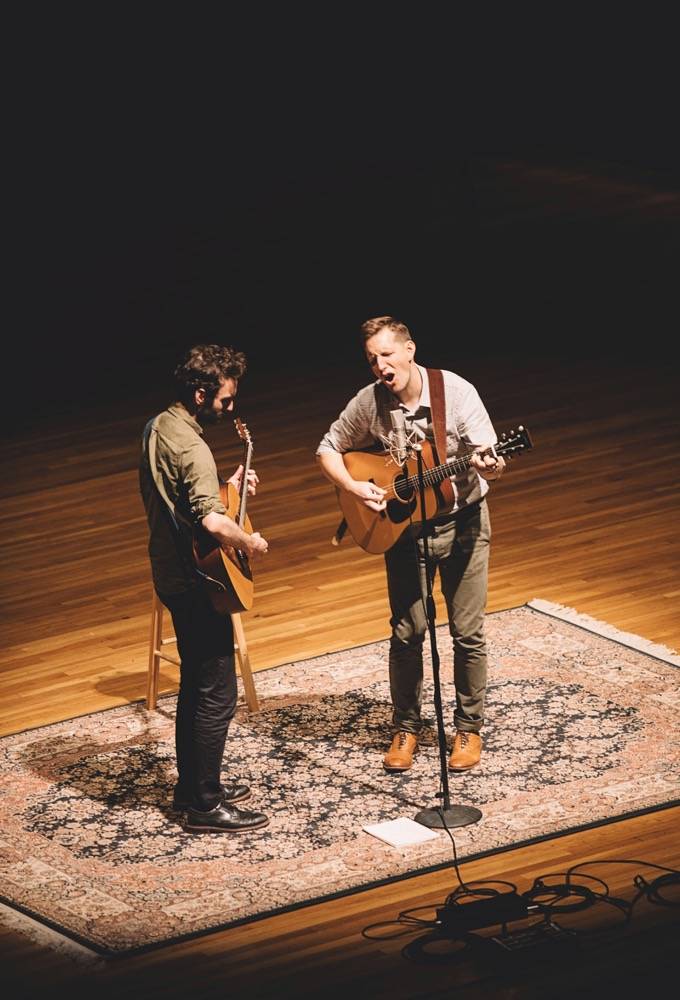
Julian Lage and Chris Eldrige at ELLNORA 2017, photo by Anna Longworth
SP: So, what performers make this iteration of ELLNOA a “must leave the comfort of your house and see a concert” type of event?
Spelman: One of the artists, Fabi Reyna, and her band, Sávila. They’re this young group that plays a sophisticated blend of a number of different styles, like cumbia and R&B. And one thing I’m really excited about is we’ll have her at the festival, in her capacity as a writer and thinker, moderating some panels for us. In her early to mid-20s, she started a magazine in her bedroom in her mom’s house in Oregon called She Shreds and it was the first and only print magazine devoted entirely to women guitarists and bass players. She’s just this very dynamic young woman who I really admire. So to have her perform and talk at several panels is really exciting.
SP: That sounds awesome! Are there any other shows or artists that you’re especially excited about?
Spelman: I mean, I’m truly excited about all of them, but just at this very moment, for some reason, you’ll have to forgive me it might have been Instagram [laughs], but one of the groups we’re having has a new album coming out and I got a little giddy. It’s the band the Messthetics. I think for many people, not just for people from Washington D.C. like myself, the shadow that the band Fugazi casts is quite a substantial one, musically and culturally, and what I love about the Messthetics is that it’s these two guys who were the rhythm section of Fugazi (bassist Joe Lolly and drummer Brendan Canty), guys who are my age [laughs], and a younger guitarist, Anthony Pirog, in a multigenerational band creating this sort of “Ornette Coleman-meets-Rush” sound. It’s just the most astonishing instrumental power trio and they’re playing a free show on Friday night and they are kind of phenomenal and I am very excited to hear them
SP: I am now also pretty excited! OK, one last question. This is kind of my usual “ending option” for these kinds of interviews, but for the people that come out to ELLNORA 2019, what should they expect?
Spelman: The unexpected!
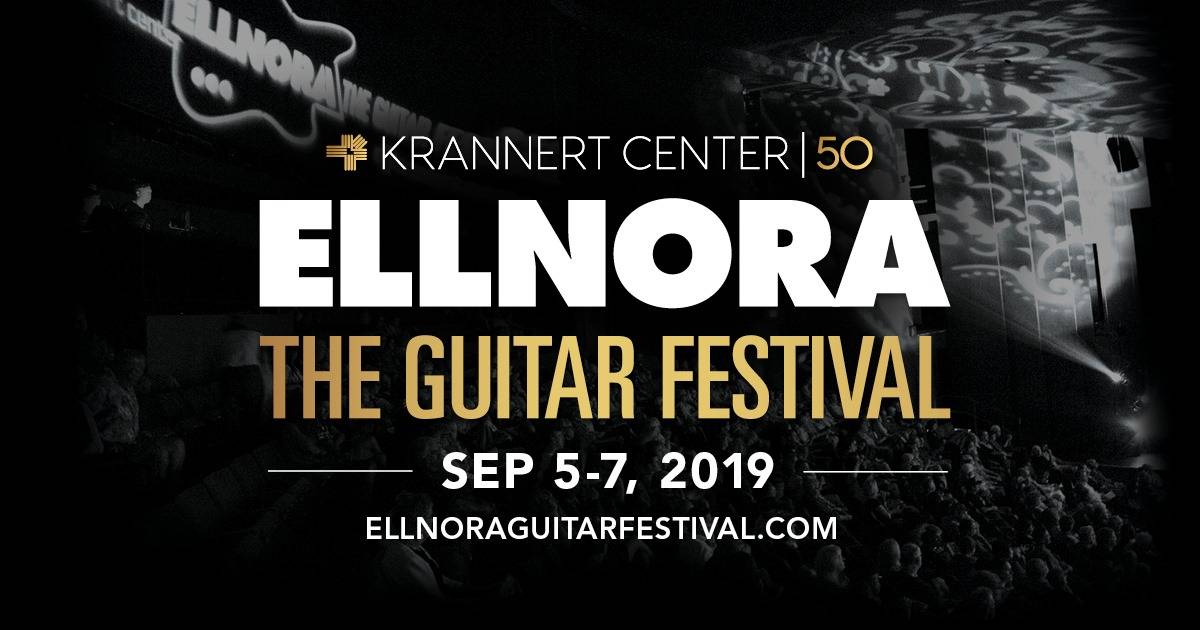
Photo from Krannert Center








